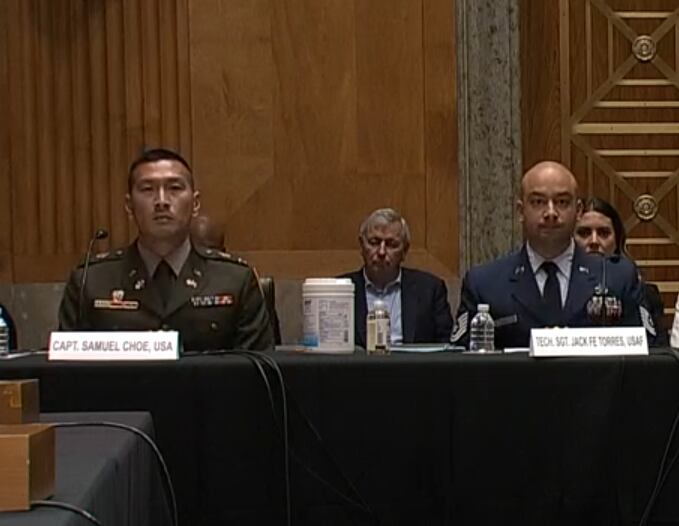Amid ongoing complaints from military families, lawmakers and advocates are questioning whether Balfour Beatty Communities should be trusted to provide housing for service members after admitting to a major scheme to defraud the government in their operations.
During a congressional hearing Tuesday, senators pressed company officials for answers in the wake of a new report that alleges continued mistreatment of military families, even after a Department of Justice fraud investigation led to a December guilty plea by Balfour Beatty, $65 million in fines and penalties, and three years of probation.
The results of the new eight-month probe by the Senate Homeland Security and Governmental Affairs permanent subcommittee on investigations are “alarming and disturbing,” said Sen. Jon Ossoff, D-Georgia, the panel’s chairman. The results point to “grave risks to the health and safety of service members and their families,” he said.
“They reveal, in my view, neglect, misconduct and abuse that persisted even after Balfour Beatty pled guilty to a scheme to defraud the U.S. between 2013 and 2019.”
The Senate investigation centered on Balfour Beatty communities at Fort Gordon, Georgia, and Sheppard Air Force Base, Texas, but the company operates military housing at 55 Army, Navy and Air Force installations in 26 states, encompassing about 43,000 homes and 150,000 residents.
Many of the same housing problems brought to light more than three years ago and addressed with congressional reforms in 2019 continue to plague military family housing managed by Balfour Beatty.
“How can we get this under control?” asked Sen. Ron Johnson, R-Wisconsin, ranking member of the subcommittee.
A housing advocate called for removal of Balfour Beatty from military privatized housing.
“We believe ending the partnership with Balfour Beatty is the only way to ensure the readiness of our service members and the safety of their families,” said Rachel Christian, chief legislative officer of the nonprofit Armed Forces Housing Advocates. She said her organization has worked extensively with families that have encountered problems with the company.
“Balfour Beatty has already admitted to defrauding the government, but it’s not just the government that has suffered in this case; it’s service members and their families,” Christian said. “They’re the ones being forgotten, pushed aside and made sick by a company that continues to choose profits over people.”
When asked later to respond to the accusation that Balfour Beatty chooses profits over people, a Balfour Beatty official called it “an unfair characterization.”
“Our people make mistakes, but to suggest that the error rate is indicative of widespread broken business is totally unfair,” said Richard Taylor, president of facility operations, renovations and construction for Balfour Beatty Communities. About one third of the company’s 1,400 employees are former or retired military, or military spouses.
But Ossoff repeatedly pressed Taylor with the question: “Why should we believe your assurances when your company engaged in a six-year-long scheme to defraud the U.S.?” The recent investigation includes evidence of work orders being changed and families’ repeated requests for help not being answered, he said.
“I reject that suggestion that it’s systemic failure,” Taylor said. “Things go wrong. We don’t always get it right the first time. We’re not perfect. … What’s important for us is that we understand where our shortcomings are and we take action to correct those deficiencies.”
Taylor asserted that Balfour Beatty is worthy of remaining in a position of trust.
He referred to information provided to subcommittee staff, the military services and DoD officials about how the company has changed its business operations over the past several years. “Results demonstrate we’re taking this very seriously, we’re taking proactive steps to ensure we don’t repeat the mistakes of individuals that worked at the company at that time.”
An Army captain and an Air Force technical sergeant testified about the problems their families have had in Balfour Beatty housing during the two years since privatized housing reforms were enacted into law.
“My daughter’s skin, once youthful and supple, is now reptilian in nature,” said Army Capt. Samuel Choe, whose family moved into their home at Fort Gordon in August 2019. The girl, now 10, sometimes wakes up in the middle of the night with her hands bloody from scratching in her sleep, he said. She developed a potentially fatal mold allergy and has been diagnosed with severe atopic dermatitis, which, when less concentrated, is more commonly known as eczema.
These problems didn’t appear until they moved into their house at Fort Gordon, he said.
Doctors have told the family that the daughter could become seriously ill or die if exposed to prolonged periods of black mold, he said. It is a potentially a lifelong illness now, and her condition has not improved since they moved to South Korea.
She received injections of the powerful drug Dupixent every two weeks from July 2021 until February — a drug with a retail cost averaging between $3,000 to $5,000 per injection, he said. He’s concerned that if he leaves the military before retirement, he’d have difficulty paying for a treatment that could cost $70,000 to $100,000 per year.

Choe said he fervently brought up his concerns about the mold, including visible mold in the bathroom and in their children’s rooms, to Balfour Beatty staff at Fort Gordon. Despite assurances, those concerns weren’t addressed. He was told not to submit work orders in the online portal, but to deal directly with Balfour Beatty management at Fort Gordon.
Balfour Beatty denied him a move to another house on post, he said, and when he sought to break the lease, Balfour Beatty resisted. Only when his own chain of command intervened was he allowed to terminate the lease early, in February 2021, without penalty, he said.
In the investigative report compiled by the subcommittee staff, a footnote states that the Choe family entered into a settlement agreement with Balfour Beatty in March 2022 without any admission of liability by either side.
Asked about Choe’s testimony, Taylor responded, “we have a different perception of what transpired.”
“We have a hard time drawing the conclusion that’s there’s a direct correlation between the condition of the home and the daughter’s medical condition.”
He also said he denies that the issues of mold weren’t addressed over a long period of time. He said the house was inspected twice and no evidence of mold was found. He said to his knowledge there were no photos of mold existing in the home; to his knowledge the doctor didn’t visit the home personally in regard to mold questions; and to his knowledge the doctor wrote a letter in late June 2020, but it was presented to the Balfour Beatty team in October 2020.
“I feel if there was a life, health, safety issue, we would have removed that family so we could remediate. I feel we followed all EPA and CDC guidelines,” said Paula Cook, vice president of transformation for Balfour Beatty Communities.
Air Force Tech. Sgt. Jack Fe Torres testified that after his family moved into their house at Sheppard Air Force Base on Aug. 4, 2020, his wife and three children started experiencing a variety of medical symptoms ranging from severe hair loss and skin rashes to breathing issues, nausea, headaches and fungal infections. After realizing they felt better when they were outside the home, and finding some moisture problems in the home, they believed there must be mold, he said.
In March 2021, a technician repairing their hot water heater forgot to isolate the water and gas valves, causing the house to smell of gas, and water to gush out into the mechanical room and the hallway, saturating the carpets. Balfour Beatty didn’t adequately remove the moisture, and mold started to grow in places they couldn’t see, he said.
Over the next months, as they reported issues with water intrusion and mold, their problems were not addressed, he claimed. The issues continued, and work orders were closed before being completed. The classification of type of repair was also changed, he said.
Torres has served as a heating, ventilation and air conditioning (HVAC) technician in the Air Force for 13 years.
“I work with work orders all the time,” he said. “I know if a customer puts in a request for a work order, the title should not be changed, and it should not be closed before completion. … That’s how it’s done in the Air Force, not close it and open a new one.”
Taylor said the company doesn’t tolerate anyone falsifying work-order information. One of the actions Balfour Beatty took in response to the fraud complaint was to change the work-order system so that local employees can’t make adjustments to them. “At the time, there was too much opportunity for those that use the system to manipulate the data,” he said. He acknowledged that a portion of an employee’s compensation was tied to their performance; now it’s tied to customer satisfaction.
“We worked with the [work-order portal] provider to make sure local sites have no opportunity to change data,” he said. “If there’s a recognized error in the work order, local sites can’t make adjustments. It has to be approved at a [vice president] level. And if we make a change, we let the military partners know.”
Ossoff said the subcommittee will continue to seek remedies for these issues.
“Our military personnel stateside and abroad sacrifice continually in service to this nation, as do their families. They deserve the very best. It’s of utmost importance that they be provided with safe housing, and that there be accountability by [DoD] and by those companies responsible for providing that housing.”
Karen has covered military families, quality of life and consumer issues for Military Times for more than 30 years, and is co-author of a chapter on media coverage of military families in the book "A Battle Plan for Supporting Military Families." She previously worked for newspapers in Guam, Norfolk, Jacksonville, Fla., and Athens, Ga.





